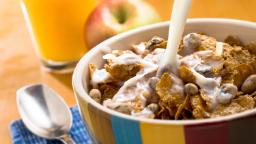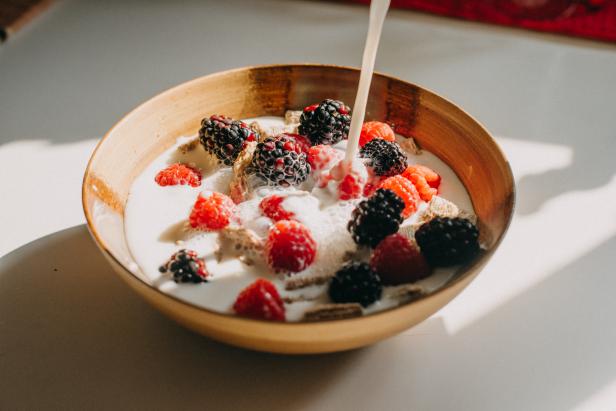
Stefania Pelfini, La Waziya Photography/Getty Images
By Dana Beninati for Food Network Kitchen
Dana is a host, chef and sommelier.
Nowadays, there are many reasons one may seek an alternative to traditional milk. Perhaps you are in search of an option that is more aligned with your ethical, environmental or health concerns. No matter the reasoning, the market now has many options available for your consideration. We have organized them into categories based on source.
What Are the Best Milk Alternatives? (Ranked by Category)
Grain Milks
Grain milks are made from processed cereal grains and have risen in popularity over the past decade with oat milk leading the pack. While all milk substitutes are more environmentally friendly than traditional cow’s milk, grain milks are said to be the least taxing on our planet.
- Oat milk – PRO: Environmentally sustainable. CON: Increasing in price.
- Rice milk – PRO: Gluten free. CON: Watery.
- Quinoa milk – PRO: High in nutrients. CON: Costly and difficult to find.
- Barley milk – PRO: Easy on allergies. CON: Very difficult to find.
Nut Milks
Nut Milks are a crowd favorite thanks to their creamy texture and generally low-calorie count. They have a pleasant flavor that plays well in a variety of dishes from coffee to curries. However, as nut allergies are becoming more and more common, these are not always the safest bet. Plus, if environmental concerns are a priority, it should be noted that these milks require a lot of water for production.
- Almond milk – PRO: Easy to find. CON: Common allergen.
- Macadamia milk – PRO: Very creamy texture. CON: Costly and hard to find.
- Cashew milk – PRO: Creamy texture. CON: Expensive.
- Hazelnut milk – PRO: Great flavor. CON: Can curdle when heated.
Seed Milks
Seed Milks can prove more difficult and costly to find but they serve as an excellent milk substitute for those who suffer from common allergies. These nutritious non-dairy beverages tend to have more protein than nut milks, but less than soy or pea protein milks.
- Chia milk – PRO: Nutrient dense. CON: Hard to find.
- Hemp milk – PRO: Creamy flavor. CON: Costly.
- Flax milk – PRO: Protein dense. CON: Hard to find.
- Sunflower milk – PRO: On the rise in popularity. CON: Could be an allergen.
Legume Milks
Legume Milks are the only category of milk substitutes that rival the protein punch of traditional cow’s milk. We love using these milks for more than just cereal because of how well they perform in baking to cheese making.
- Soy milk – PRO: Affordable and nutritious. CON: Common allergen.
- Pea protein milk – PRO: Protein dense. CON: Curdles when heated.
- Peanut milk – PRO: Affordable CON: Common allergen.
Plant Milks is an ever-expanding category of milk substitutes that we expect to see even more experimentation within upcoming years. Technological developments will continue to result in new non-dairy alternatives that solve issues of sustainability and health. In the meantime, there are two common plant-based sources of milk substitutes.
- Coconut milk (canned) – PRO: Rich and creamy. CON: Intense flavor.
- Coconut milk beverages – PRO: More neutral in flavor CON: Costly.
- Potato milk – PRO: Inexpensive and easy on allergies. CON: Hard to find.
What Milk Substitutes Taste Most Like Regular Milk?
The milk substitute that tastes most like regular milk, is just that – traditional cow’s milk where the lactose has been removed. Lactose intolerant milk products like Fairlife are an excellent substitute for those comfortable with consuming an animal product.
However, if you need a vegan alternative, consider the following replacements for each type of cow’s milk. First, we recommend skim milk drinkers try rice milk. The texture is a close match for fat free cow’s milk. If 1% milk is what you are accustomed to give soy milk a try. It is nutritionally similar in fat content but offers even more protein. If 2% milk has been your jam, we recommend oat milk. It’s natural sweetness and mouth feel is sure to satisfy. Lastly, if you are a whole milk drinker, reach for the richness of nut milks, particularly macadamia, as they will offer the closest match to the full fat experience you crave. If you would like to try your hand at making your own milk substitutes, check out our guide.
What Is the Healthiest Milk Alternative?
First off, when seeking the healthiest non-dairy milk, we recommend looking for products labeled “unsweetened.” Except for coconut milk, non-dairy milks contain less fat than dairy milk across the board. This difference in most striking when we look closely at saturated fats, which is why milk alternatives come highly recommended for those watching their cholesterol. While lower fat content may sound appealing, fat plays an important role in child development, hence why the USDA continues to recommend whole milk consumption up until the age of two. Additionally, if protein is your priority, then reach for soy or pea protein milk. They are the only substitutes that match the protein content of dairy milk, which is 9 grams per cup. Other plant-based milks, like almond and coconut, contain very little protein per serving. Milks made from oats, hazelnuts and hemp fall somewhere in between on the protein scale.
We would be remiss to speak about nutrition and overlook the science of fortification, which is very common in the non-dairy milk industry. Fortification is the addition of nutrients into a food an in effort to boost the product’s nutritional value. In the case of non-dairy milks, calcium and Vitamin D are frequently added to emulate the nutritional package of cow’s milk. While this sounds beneficial, it remains to be determined if our bodies can consistently absorb those nutrients which are added. This is because vitamins and minerals that naturally occur in foods are more bioavailable than those added later. In other words, our bodies absorb them more easily. Finally, it is important to note that most organic non-dairy milks will not be fortified.
Best Milk Substitutes for Coffee
The way alternative milks perform in a piping hot mug of coffee often comes down to brand variation. For example, some almond milks blend beautifully into hot beverages and others curdle immediately. When enjoying a cup of joe, we like oat and cashew milk best. Avoid rice milk and pea protein milk, which water down the coffee and curdle it respectively. If you are a fan of coconut milk, reach for coconut milk beverages that match the consistency of cow’s milk, rather than the thick stuff from the can. For those who enjoy steaming milk for a latte or cappuccino, seek out “barista” versions of non-dairy milks, as they result in the stiffest froth. You can find all our recommendations here.
Best Milk Substitutes for Baking
Perhaps you are looking to create a vegan treat and need the best substitute for cow’s milk when breaking. If your priority is baking over drinking, look no further than the OG of all milk subs, soy milk. A timeless invention from the 1910’s, soy milk remains your best substitute and here’s a deep dive as to why.



























































